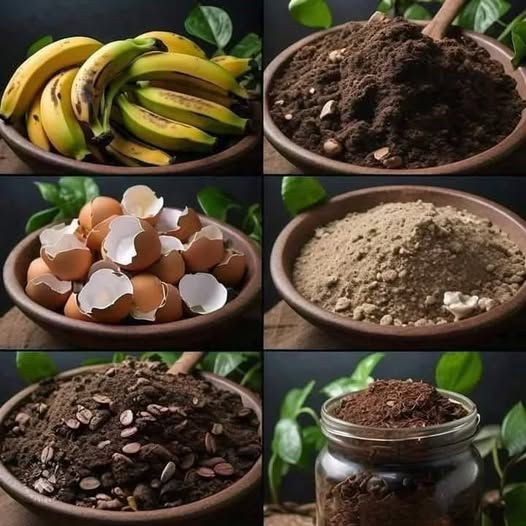Introduction
Do you want to create a vibrant, thriving garden without resorting to harsh chemicals? Homemade plant fertilizers are an eco-friendly and cost-effective way to nourish your plants and promote healthy growth. In this blog post, we’ll explore 12 easy-to-make fertilizers using common household items. These natural solutions will provide your plants with essential nutrients, improve soil quality, and enhance their overall health.
Understanding Plant Nutrition
Before we dive into the recipes, let’s briefly discuss the essential nutrients that plants need to thrive:
- Nitrogen (N): Promotes healthy leaf growth and vibrant green color.
- Phosphorus (P): Encourages strong root development and flower production.
- Potassium (K): Boosts overall plant health, disease resistance, and fruit production.
By providing your plants with a balanced supply of these nutrients, you’ll create a lush, flourishing garden.
12 Homemade Plant Fertilizers
-
Compost Tea:
- Ingredients:
- 1 cup of compost
- 1 gallon of water
- Method:
- Steep the compost in water for 24-48 hours, then strain.
- Dilute the tea with water and apply it to your plants weekly.
- Ingredients:
-
Eggshell Fertilizer:
- Ingredients:
- Eggshells
- Method:
- Crush the eggshells into small pieces.
- Sprinkle them around the base of your plants or add them to your compost pile.
- Ingredients:
-
Coffee Grounds Fertilizer:
- Ingredients:
- Used coffee grounds
- Method:
- Scatter the coffee grounds around your plants, avoiding direct contact with the stems.
- They can also be added to your compost pile.
- Ingredients:
-
Banana Peel Fertilizer:
- Ingredients:
- Banana peels
- Method:
- Bury the banana peels in the soil near your plants.
- They will decompose and release potassium and other nutrients.
- Ingredients:
-
Wood Ash Fertilizer:
- Ingredients:
- Wood ash from a clean wood-burning source
- Method:
- Sprinkle the wood ash around your plants, avoiding direct contact with the leaves.
- It’s a good source of potassium and calcium.
- Ingredients:
-
Fish Emulsion Fertilizer:
- Ingredients:
- Fish emulsion
- Method:
- Dilute the fish emulsion according to package instructions and apply it to your plants.
- It’s a rich source of nitrogen and phosphorus.
- Ingredients:
-
Seaweed Fertilizer:
- Ingredients:
- Dried seaweed
- Method:
- Soak the seaweed in water to create a nutrient-rich liquid.
- Dilute the liquid and apply it to your plants.
- Ingredients:
-
Neem Oil Fertilizer:
- Ingredients:
- Neem oil
- Method:
- Dilute the neem oil with water and apply it to your plants as a foliar spray.
- It helps repel pests and promotes healthy growth.
- Ingredients:
-
Epsom Salt Fertilizer:
- Ingredients:
- Epsom salt
- Method:
- Dissolve Epsom salt in water and apply it to your plants, especially tomatoes and roses.
- It provides magnesium and sulfur, essential for chlorophyll production.
- Ingredients:
-
Bone Meal Fertilizer:
- Ingredients:
- Bone meal
- Method:
- Sprinkle bone meal around your plants, especially those that need extra phosphorus.
- It’s a slow-release fertilizer that provides long-lasting nutrients.
- Manure Tea:
- Ingredients:
- Manure (well-composted)
- Water
- Method:
- Steep the manure in water for a few days, then strain.
- Dilute the tea and apply it to your plants.
- Compost:
- Ingredients:
- Kitchen scraps, yard waste, and other organic materials
- Method:
- Create a compost pile and let it decompose over time.
- Add the finished compost to your garden to improve soil fertility and structure.
Tips for Using Homemade Fertilizers:
- Test the soil: Before applying any fertilizer, test your soil to determine its nutrient levels. This will help you tailor your fertilizer choices to your specific needs.
- Water your plants: Ensure your plants are well-watered before applying fertilizer to prevent root burn.
- Apply fertilizer in moderation: Overfertilizing can harm your plants. Follow the recommended application rates and frequencies.
- Rotate your crops: Rotating your crops can help maintain soil fertility and reduce the risk of pest and disease problems.
- Mulch your garden: Mulching helps retain moisture, suppress weeds, and regulate soil temperature.
By using these homemade fertilizers and following these tips, you can create a beautiful, sustainable garden that thrives year-round. Happy gardening!
